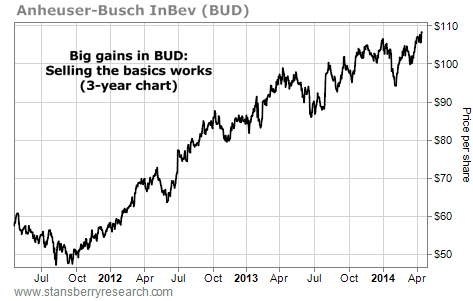| Home | About Us | Resources | Archive | Free Reports | Market Window |
A Triumph of Lethargy and SlothBy
Thursday, April 17, 2014
It's an inspiring tale... a triumph of lethargy and sloth.
And if you take its wisdom to heart, you'll be ahead of 99.9% of your fellow investors.
The tale – and the wisdom – comes from Robert Kirby.
Kirby was a great money manager that wrote a lot of wise things about investing. He was active in the latter half of the 20th century... and cut from the same intellectual cloth as Warren Buffett.
One of Kirby's best ideas is the "coffee can" portfolio...
Kirby first wrote about the coffee can idea in the fall of 1984 in The Journal of Portfolio Management...
"The coffee can portfolio concept harkens back to the Old West, when people put their valuable possessions in a coffee can and kept it under the mattress," Kirby wrote. "The success of the program depended entirely on the wisdom and foresight used to select the objects to be placed in the coffee can to begin with."
The idea is simple enough: You find the best stocks you can and let them sit for 10 years. You incur practically no costs with such a portfolio. And it is certainly easy to manage.
The biggest benefit, though, is a bit more subtle and meaningful. It works because it keeps your worst instincts from hurting you.
In his paper, Kirby told the story about how his idea came about.
"The coffee can idea first occurred to me in the 1950s," Kirby writes. He worked for a big firm that counseled individuals on their investments then. He had a client whom he had worked with for 10 years whose husband died suddenly. She inherited his stock portfolio, which she moved to Kirby's care. Looking at the portfolio, Kirby writes:
In doing this, a wonderful thing happened. Yes, it meant his portfolio had a number of broken stories worth $2,000 or so – small positions. But he also had a few large holdings worth $100,000 each. The kicker, though, was this: He had one jumbo position of $800,000 that alone was bigger than the total value of his wife's portfolio. As Kirby writes, "[It] came from a small commitment in a company called Haloid; this later turned out to be a zillion shares of Xerox." As I mentioned, it's an inspiring tale, a triumph of lethargy and sloth.
It shows clearly how the coffee can portfolio is designed to protect you from yourself – the obsession with checking stock prices, the frenetic buying and selling, the hand-wringing over the economy and bad news. It forces you to extend your time horizon. You don't put anything in your coffee can that you don't think is a good 10-year bet.
Poor Kirby had been diligently managing the wife's account – keeping up with earnings reports, trimming stocks and adding new positions. All the while, he would have been better off if he followed the idler's creed and just held on to his ideas.
The coffee can portfolio is the ultimate buy-and-hold portfolio. You put a bushel of well-chosen stocks in a coffee can and forget about them for 10 years. Open after 10 years and, the theory goes, pleasant surprises await you.
I've never read anything by Kirby that didn't strike me as wise. (Someone ought to republish his papers in a book.) He is the antithesis of the trader, of those who would try to chase what's hot and what's moving. In another paper he writes:
When you know you can sell something almost instantaneously, it messes with how you think about the purchase in the first place. You can be careless because you can get out quickly. If you knew that every time you bought a stock you would have to hold it for a year, let's say, then you would buy with much more diligence.
That's a simple idea. And Kirby's advice is a logical extension of it:
It is almost impossibly hard to live by this rule. With constant measurement of returns and the oppressive 24-7 media cycle, the pressure to act is immense.
When your mindless neighbor doubles his money in Tesla in two months, the idea of an internal rate of return seems irrelevant and even pointless.
But then again, these are exactly the kinds of defeatist sentiments that bubble up during years of stock market exuberance, like 1929, 1999, and 2007.
Ironically, this is just when such unfashionable ideas are most important. That's really the point I would leave you with. Instead of worrying about the latest story on CNBC... instead of worrying about the stock market falling 2% in a day... focus on finding great businesses you can place in your coffee can. Resist the urge to sell them. Resist the urge to act.
It's this kind of careful thinking, along with plenty of lethargy and sloth, which will make you money over the long-term.
Regards,
Chris Mayer
Further Reading:
Managing your own money is much simpler than most people think. The reason people think it's complicated is that Wall Street wants it that way. That's why Dan Ferris recommends never asking fund managers or brokers about managing money. Instead, "ask millionaires and billionaires who made their money buying and selling stocks, bonds, and real estate," Dan writes. "They'll tell you what to do... and it'll actually work." Get all the details here.
Market NotesTHE BASICS: STILL WORKING Today's chart drives home one of our favorite investment ideas. It proves once again that selling the basics isn't exciting... it just works.
Over the years, we've written dozens of notes about selling the basics. The idea here is that, when it comes to investing in the growth of consumer markets like Brazil, India, and China, it's best to own companies that sell "the basics" like soda, beer, and cigarettes to these markets.
"Boring" products like these enjoy steady demand... they're often addictive... and there's scant risk that a new technology will make having a beer after work obsolete. Plus, well-run companies in these industries generate huge cash flows and big dividends.
One of the ultimate "basics" stocks is alcohol giant Anheuser-Busch InBev (BUD). It's the world's largest beer brewer. As you can see from the three-year chart below, BUD has climbed from $60 per share to $108 per share. Just this week, shares hit a new all-time high. We state again: Selling the basics isn't exciting... it just works!
 |
Recent Articles
|



